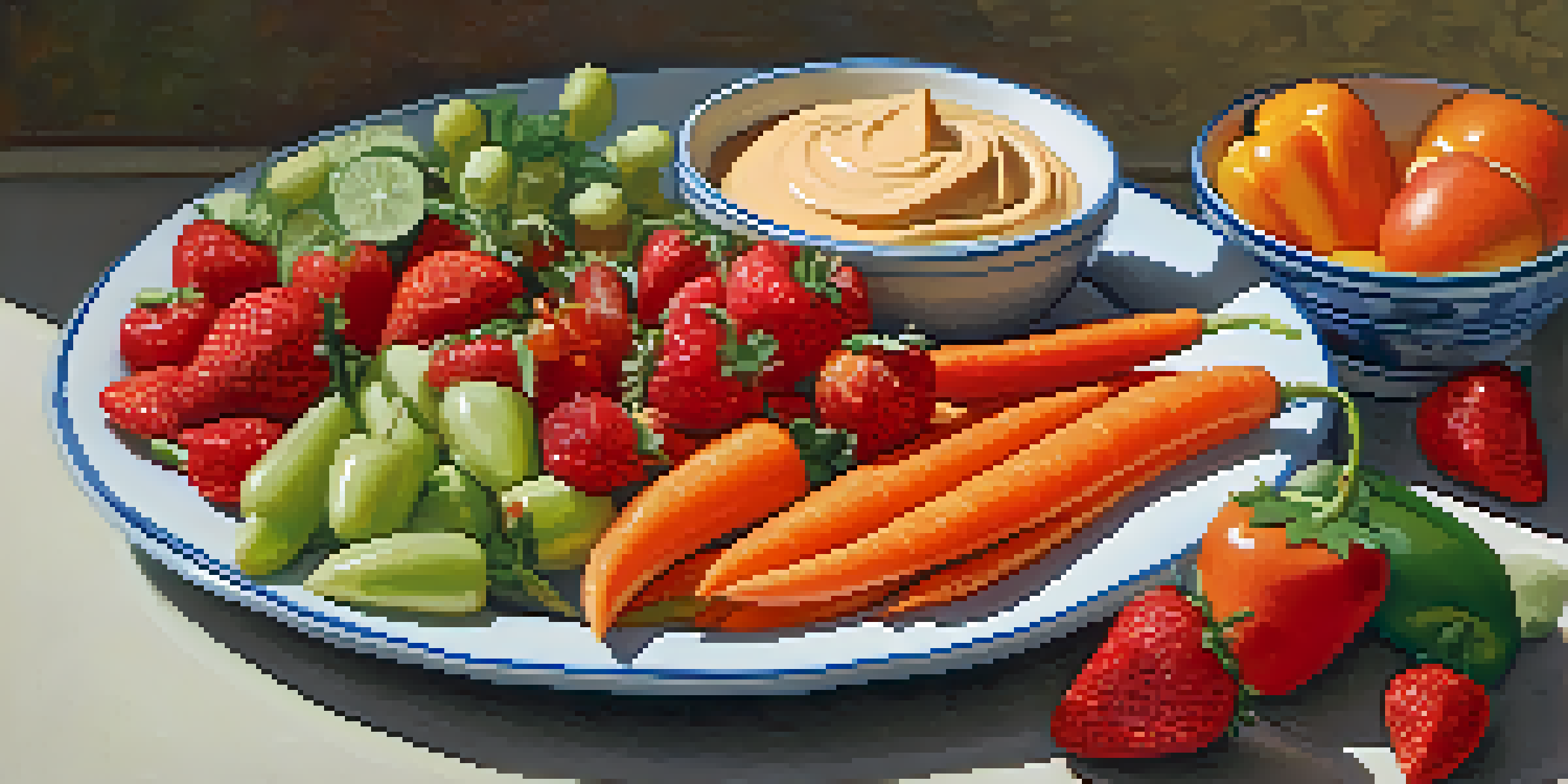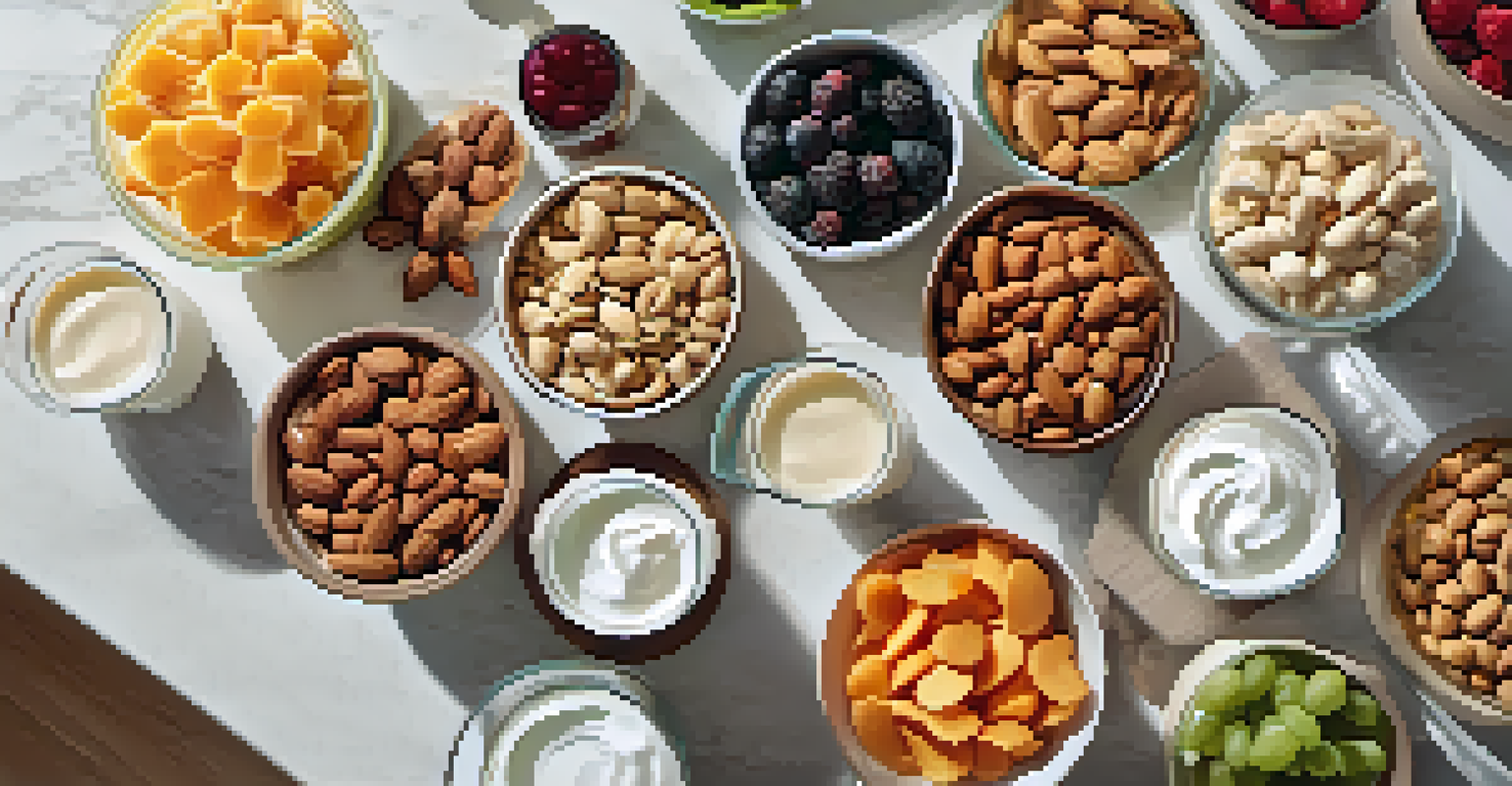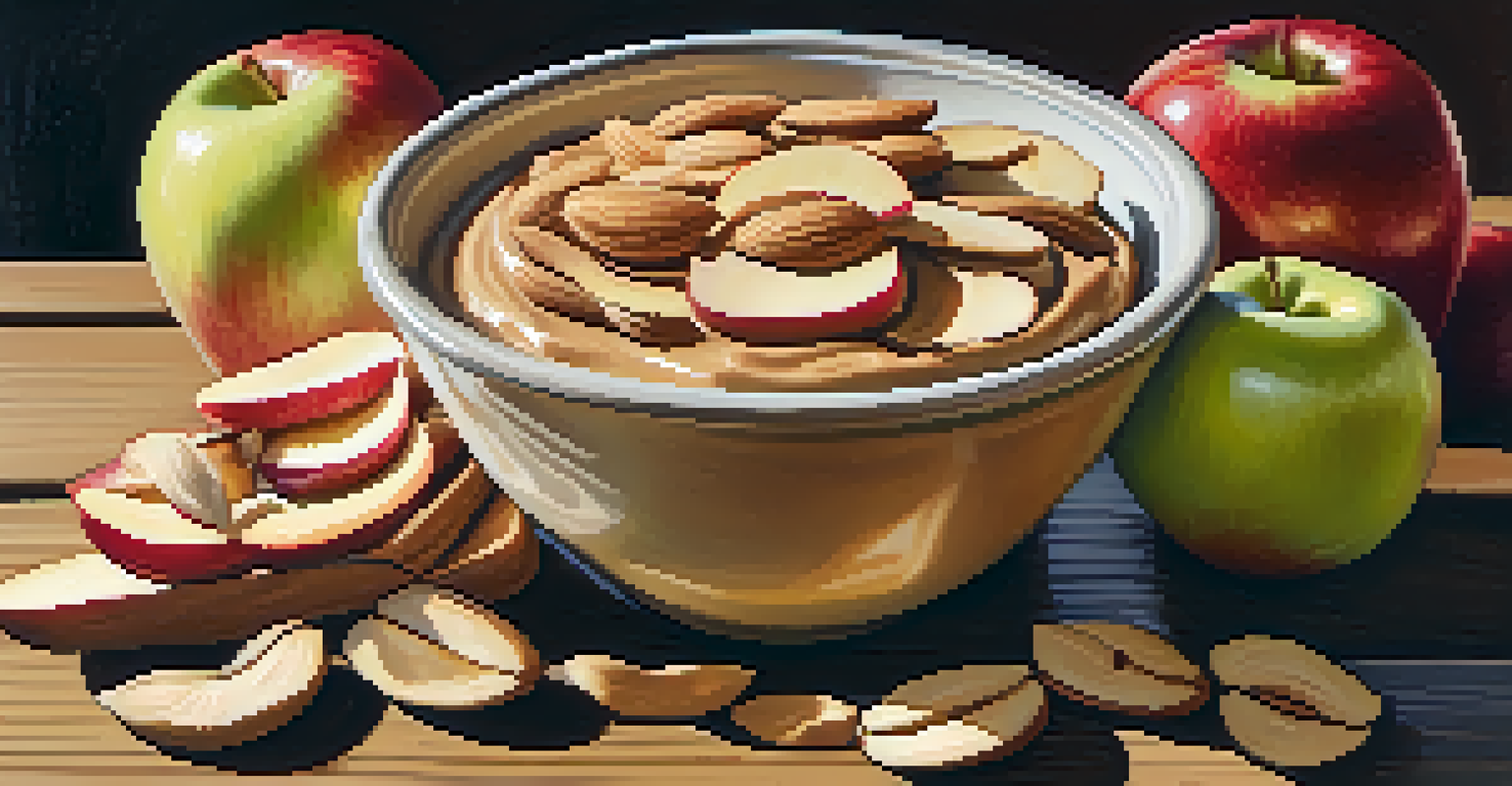How to Choose Healthy Snacks for Balanced Nutrition

Understanding the Importance of Healthy Snacks
Snacking can be a vital part of maintaining a balanced diet. It's not just about satisfying hunger; the right snacks can provide essential nutrients that your body needs throughout the day. When you choose healthy options, you support your overall health and energy levels, making it easier to focus on your daily tasks.
Let food be thy medicine and medicine be thy food.
Consider how snacks can bridge the gap between meals, especially if you have a busy lifestyle. They can prevent you from reaching for unhealthy options when hunger strikes unexpectedly. By choosing wisely, you can ensure that your snacks are not just fillers but contribute positively to your nutritional goals.
Healthy snacks can also play a role in managing weight and boosting metabolism. When you opt for nutrient-dense snacks instead of empty calories, you can feel full longer and reduce the likelihood of overeating during meals. This is especially beneficial for those looking to maintain or lose weight.
Identifying Nutrient-Dense Snack Options
Nutrient-dense snacks are those that provide a high amount of vitamins, minerals, and other beneficial nutrients relative to their calorie content. Think of foods like fruits, vegetables, nuts, and whole grains as your go-to options. These snacks not only fill you up but also nourish your body.

For example, instead of reaching for a bag of chips, consider snacking on baby carrots with hummus. This simple swap offers fiber, vitamins, and healthy fats, giving your body the fuel it needs. Similarly, a handful of nuts can provide protein and healthy fats that keep you energized throughout the day.
Healthy Snacks Boost Nutrition
Choosing nutrient-dense snacks helps maintain energy levels and supports overall health.
It's essential to explore a variety of foods to keep your snack time exciting. This not only helps in preventing boredom but also ensures you’re getting a wide range of nutrients. Experiment with different fruits, veggies, and whole grains to discover what you love!
Reading Nutrition Labels for Smart Choices
When purchasing packaged snacks, reading nutrition labels is crucial. These labels provide important information about the ingredients and nutritional content, helping you make informed choices. Look for snacks that are low in added sugars, sodium, and unhealthy fats.
You are what you eat, so don't be fast, cheap, easy, or fake.
Pay attention to serving sizes as well, as it’s easy to underestimate how much you are consuming. A snack that seems healthy can quickly become unhealthy if you eat more than the recommended serving. Understanding these details can help you stick to your nutrition goals.
Additionally, familiarizing yourself with common terms can help you navigate labels better. Words like 'whole grain,' 'low-fat,' and 'organic' can indicate healthier choices, but they can also be misleading. Always look beyond the packaging claims to evaluate the actual nutritional value.
Balancing Macros: Proteins, Carbs, and Fats
A well-rounded snack should ideally contain a balance of macronutrients: protein, carbohydrates, and healthy fats. This combination not only keeps you satisfied longer but also provides sustained energy. For instance, pairing apple slices with almond butter gives you a tasty mix of carbs, protein, and healthy fats.
Understanding your body's specific needs can also guide your choices. If you’ve just finished a workout, a protein-packed snack might be ideal for muscle recovery. On the other hand, if you’re feeling sluggish in the afternoon, a snack with complex carbs and healthy fats can help boost your energy.
Portion Control is Key
Practicing portion control can prevent overeating, even with healthy snacks.
Experimenting with different combinations can be fun! Try yogurt with berries and granola or whole-grain toast with avocado. These snacks will not only taste great but also provide the balanced nutrition your body craves.
Portion Control: How Much is Enough?
Even the healthiest snacks can lead to overeating if portion control isn’t practiced. It’s easy to mindlessly munch on snacks, especially when they're readily available. To avoid this, try pre-portioning your snacks in advance, so you know exactly how much you’re consuming.
Using smaller bowls or containers can also help control portions. For example, instead of eating directly from a large bag of nuts, pour a small handful into a bowl. This simple act can prevent you from overindulging while still allowing you to enjoy your favorite snacks.
Listening to your body is key as well. If you feel satisfied after a small snack, there’s no need to eat more. Being mindful of your hunger cues can help you stay in tune with your body and ensure that you’re eating the right amounts.
Incorporating Seasonal and Local Foods
Choosing seasonal and local foods not only supports your health but also benefits the environment. Seasonal fruits and vegetables often taste better and are more nutritious since they are harvested at their peak. Think juicy strawberries in the summer or hearty squash in the fall as delicious snack options.
Local farmers' markets can be great places to find fresh produce and unique snack ideas. Exploring what's available in your area encourages variety in your diet and often leads to discovering new favorites. Plus, supporting local agriculture contributes to your community's economy.
Prep Snacks for Convenience
Preparing snacks in advance makes it easier to choose nutritious options on the go.
Incorporating these foods into your snacking routine is easy. Make a colorful fruit salad or whip up a veggie platter with a homemade dip. Not only are these options healthy, but they also bring a burst of flavor to your snack time.
Easy Prep Ideas for On-the-Go Snacking
In our fast-paced lives, having healthy snacks ready to go is essential. Preparing snacks in advance can save time and help you avoid the temptation of less nutritious options. Simple preparations, like chopping veggies or portioning out nuts, can make a big difference.
Consider creating a snack station in your fridge or pantry. Having a designated space for healthy snacks makes it easier to grab something nutritious when you're in a rush. You can stock it with pre-cut fruits, yogurt, or whole-grain crackers for quick access.

Batch cooking snacks can also be a game-changer. For instance, making energy bites or homemade granola bars in advance can provide you with tasty and healthy options throughout the week. With a little planning, you can ensure that nutritious snacking is always within reach.